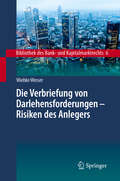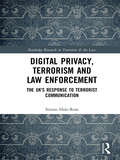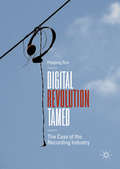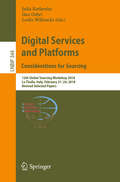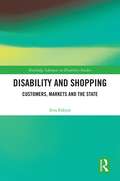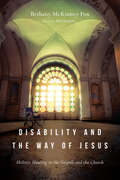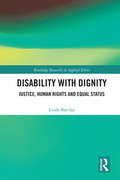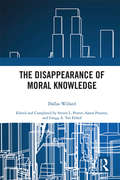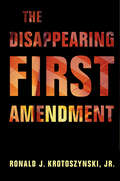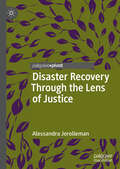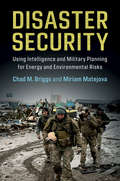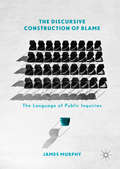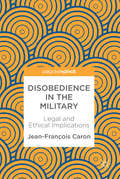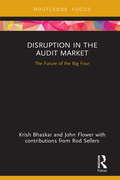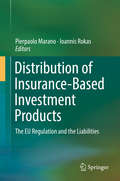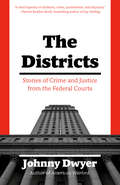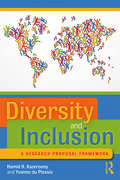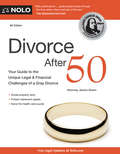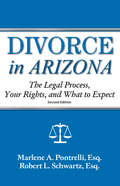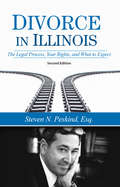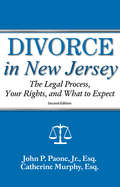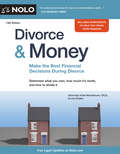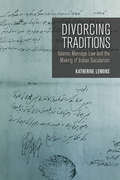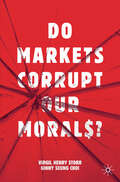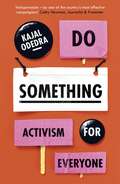- Table View
- List View
Die Verbriefung von Darlehensforderungen - Risiken des Anlegers: Risiken Des Anlegers (Bibliothek des Bank- und Kapitalmarktrechts #6)
by Wiebke WesserDas Buch setzt sich mit der Verbriefung von Darlehensforderungen in Gestalt forderungsbesicherter Wertpapiere auseinander und legt den Schwerpunkt auf die damit einhergehenden Risiken des Anlegers. Der Verbriefungsvorgang wird allgemein dargestellt und anhand einer Beispielstransaktion nach deutschem Recht eingeordnet. Mögliche Risiken werden untergliedert in allgemeine, objekt-, struktur-, personen-, umfeld- und bewertungsbedingte Risiken sowie nach Durchsetzungsrisiken und unter Berücksichtigung von Wechselwirkungen eingehend beleuchtet. Zur Klärung etwaiger Schadensersatzansprüche werden die Risiken im Rahmen vorvertraglicher Aufklärungspflichten, der Vermögensverwaltung, Vermögensbetreuung, Anlageberatung und Anlagevermittlung sowie der Prospekthaftung differenziert auf ihre Aufklärungspflichtigkeit hin untersucht. Weitergehend werden in Betracht kommende Kündigungsrechte des Anlegers bei Risikorealisierung untersucht, wobei sich die Arbeit intensiv mit der Anwendbarkeit der §§ 313, 314 und 490 Abs. 1 BGB auf Inhaberschuldverschreibungen beschäftigt.
Digital Privacy, Terrorism and Law Enforcement: The UK's Response to Terrorist Communication (Routledge Research in Terrorism and the Law)
by Simon Hale-RossThis book examines the UK’s response to terrorist communication. Its principle question asks, has individual privacy and collective security been successfully managed and balanced? The author begins by assessing several technologically-based problems facing British law enforcement agencies, including use of the Internet; the existence of ‘darknet’; untraceable Internet telephone calls and messages; smart encrypted device direct messaging applications; and commercially available encryption software. These problems are then related to the traceability and typecasting of potential terrorists, showing that law enforcement agencies are searching for needles in the ever-expanding haystacks. To this end, the book examines the bulk powers of digital surveillance introduced by the Investigatory Powers Act 2016. The book then moves on to assess whether these new powers and the new legislative safeguards introduced are compatible with international human rights standards. The author creates a ‘digital rights criterion’ from which to challenge the bulk surveillance powers against human rights norms. Lord Carlile of Berriew CBE QC in recommending this book notes this particular legal advancement, commenting that rightly so the author concludes the UK has fairly balanced individual privacy with collective security. The book further analyses the potential impact on intelligence exchange between the EU and the UK, following Brexit. Using the US as a case study, the book shows that UK laws must remain within the ambit of EU law and the Court of Justice of the European Union's (CJEU's) jurisprudence, to maintain the effectiveness of the exchange. It addresses the topics with regard to terrorism and counterterrorism methods and will be of interest to researchers, academics, professionals, and students researching counterterrorism and digital electronic communications, international human rights, data protection, and international intelligence exchange.
Digital Revolution Tamed: The Case of the Recording Industry
by Hyojung SunThis book explores why widespread predictions of the radical transformation in the recording industry did not materialise. Although the growing revenue generated from streaming signals the recovery of the digital music business, it is important to ask to what extent is the current development a response to digital innovation. Hyojung Sun finds the answer in the detailed innovation process that has taken place since Napster. She reassesses the way digital music technologies were encultured in complex music valorisation processes and demonstrates how the industry has become reintermediated rather than disintermediated. This book offers a new understanding of digital disruption in the recording industry. It captures the complexity of the innovation processes that brought about technological development, which arose as a result of interaction across the circuit of the recording business – production, distribution, valorisation, and consumption. By offering a more sophisticated account than the prevailing dichotomy, the book exposes deterministic myths surrounding the radical transformation of the industry.
Digital Services and Platforms. Considerations for Sourcing: 12th Global Sourcing Workshop 2018, La Thuile, Italy, February 21–24, 2018, Revised Selected Papers (Lecture Notes in Business Information Processing #344)
by Julia Kotlarsky Ilan Oshri Leslie WillcocksThis book constitutes revised selected papers from the 12th international Global Sourcing Workshop 2018, held in La Thuile, Italy, in February 2018. The 9 contributions included were carefully reviewed and selected from 40 submissions. The book offers a review of the key topics in sourcing of services, populated with practical frameworks that serve as a tool kit to students and managers. The range of topics covered in this book is wide and diverse, offering micro and macro perspectives on successful sourcing of services. Case studies from various organizations, industries and countries are used extensively throughout the book, giving it a unique position within the current literature offering.
Disability and Shopping: Customers, Markets and the State (Routledge Advances in Disability Studies)
by Ieva EskytėDisability and Shopping:Customers, Markets and the State provides an examination of the diverse experiences and perspectives of disabled customers, industry and civil society. It discusses how the interaction between the three stakeholders should be shaped at aiming to decrease inequality and marginalisation. Shopping is a part of everyday modern life and yet businesses struggle to adequately meet the needs of 80 million disabled customers in the European Union single market. While there has been extensive research into how individuals engage in customer roles and experience, and how businesses and policies both shape and respond to these, little is known of the same dynamics and practices regarding people with impairments. This book addresses this need by revealing the perspectives, interactions and experiences of disabled customers and their interaction with policy and business. It will be required reading for all scholars and students of disability studies, sociology, marketing and customer relations.
Disability and the Way of Jesus: Holistic Healing in the Gospels and the Church
by Bethany McKinney FoxWhat does healing mean for people with disabilities? The Gospels are filled with accounts of Jesus offering physical healing. But even as churches today seek to follow the way of Jesus, people with disabilities all too often experience the very opposite of healing and life-giving community: exclusion, judgment, barriers. Misinterpretation and misapplication of biblical healing narratives can do great damage, yet those who take the Bible seriously mustn't avoid these passages either. Bethany McKinney Fox believes that Christian communities are better off when people with disabilities are an integral part of our common life. In Disability and the Way of Jesus, she considers how the stories of Jesus' healings can guide us toward mutual thriving. How did Jesus' original audience understand his works of healing, and how should we relate to these texts today? After examining the healing narratives in their biblical and cultural contexts, Fox considers perspectives from medical doctors, disability scholars, and pastors to more fully understand what Jesus does as he heals and how he points the way for relationships with people with disabilities. Personal reflections from Christians with disabilities are featured throughout the book, which concludes with suggestions for concrete practices adaptable to a variety of church settings. Bridging biblical studies, ethics, and disability studies with the work of practitioners, Fox provides a unique resource that is both theologically grounded and winsomely practical. Disability and the Way of Jesus provides new lenses on holistic healing for scholars, laypeople, and ministry leaders who care about welcoming all people as Jesus would.
Disability with Dignity: Justice, Human Rights and Equal Status (Routledge Research in Applied Ethics)
by Linda BarclayPhilosophical interest in disability is rapidly expanding. Philosophers are beginning to grasp the complexity of disability—as a category, with respect to well-being and as a marker of identity. However, the philosophical literature on justice and human rights has often been limited in scope and somewhat abstract. Not enough sustained attention has been paid to the concrete claims made by people with disabilities, concerning their human rights, their legal entitlements and their access to important goods, services and resources. This book discusses how effectively philosophical approaches to distributive justice and human rights can support these concrete claims. It argues that these approaches often fail to lend clear support to common disability demands, revealing both the limitations of existing philosophical theories and the inflated nature of some of these demands. Moving beyond entitlements, the author also develops a unique conception of dignity, which she argues illuminates the specific indignities experienced by people with disabilities in the allocation of goods, in the common experience of discrimination and in a wide range of interpersonal interactions. Disability with Dignity offers an accessible and extended philosophical discussion of disability, justice and human rights. It provides a comprehensive assessment of the benefits and pitfalls of theories of human rights and justice for advancing justice for the disabled. It brings the moral importance of dignity to the centre, arguing that justice must be pursued in a way that preserves and promotes the dignity of people with disabilities.
The Disappearance of Moral Knowledge
by Dallas WillardBased on an unfinished manuscript by the late philosopher Dallas Willard, this book makes the case that the 20th century saw a massive shift in Western beliefs and attitudes concerning the possibility of moral knowledge, such that knowledge of the moral life and of its conduct is no longer routinely available from the social institutions long thought to be responsible for it. In this sense, moral knowledge—as a publicly available resource for living—has disappeared. Via a detailed survey of main developments in ethical theory from the late 19th through the late 20th centuries, Willard explains philosophy’s role in this shift. In pointing out the shortcomings of these developments, he shows that the shift was not the result of rational argument or discovery, but largely of arational social forces—in other words, there was no good reason for moral knowledge to have disappeared. The Disappearance of Moral Knowledge is a unique contribution to the literature on the history of ethics and social morality. Its review of historical work on moral knowledge covers a wide range of thinkers including T.H Green, G.E Moore, Charles L. Stevenson, John Rawls, and Alasdair MacIntyre. But, most importantly, it concludes with a novel proposal for how we might reclaim moral knowledge that is inspired by the phenomenological approach of Knud Logstrup and Emmanuel Levinas. Edited and eventually completed by three of Willard’s former graduate students, this book marks the culmination of Willard’s project to find a secure basis in knowledge for the moral life.
The Disappearing First Amendment
by Ronald J. Krotoszynski, Jr.The standard account of the First Amendment presupposes that the Supreme Court has consistently expanded the scope of free speech rights over time. This account holds true in some areas, but not in others. In this illuminating work, Ronald J. Krotoszynski, Jr acknowledges that the contemporary Supreme Court rigorously enforces the rules against content and viewpoint discrimination for those who possess the wherewithal to speak but when citizens need the government's assistance to speak - for example, access to public property for protest - free speech rights have declined. Instead of using open-ended balancing tests, the Roberts and Rehnquist Courts have opted for bright line, categorical rules that minimize judicial discretion. Opportunities for democratic engagement could be enhanced, however, if the federal courts returned to the Warren Court's balancing approach and vested federal judges with discretionary authority to require government to assist would-be speakers. This book should be read by anyone concerned with free speech and its place in democratic self-government.
Disaster Recovery Through the Lens of Justice
by Alessandra JerollemanThere has been increased attention to the topics of disaster recovery and disaster resilience over the past several years, particularly as catastrophic events such as Hurricane Katrina and Superstorm Sandy have brought to light the increasing vulnerability of so many communities. This manuscript brings together existing research, along with policy analysis, in order to look at disaster recovery through the lens of justice. This includes understanding the mechanisms through which vulnerability is exacerbated, and the extent to which the regulations and agency cultures drive this outcome. While existing analyses have sought to understand the particular characteristics of both resilient and vulnerable communities, there have been few attempts to understand the systemic inequities and injustice that is built into United States disaster policies, programs, and legislation. This manuscript thus begins from the understanding that social and economic structures, including land use policies and historic practices such as redlining, have concentrated hazard risk into vulnerable zones whose inhabitants do not benefit from the very policies that create and increase their risk.
Disaster Security: Using Intelligence and Military Planning for Energy and Environmental Risks
by Chad M. Briggs Miriam MatejovaThis book is for a broad audience of practitioners, policymakers, scholars, and anyone interested in scenarios, simulations, and disaster planning. Readers are led through several different planning scenarios that have been developed over several years under the auspices of the US Department of Energy, the US Air Force, and continued work at GlobalInt LLC. These scenarios present different security challenges and their potential cascading impacts on global systems - from the melting of glaciers in the Andes, to hurricanes in New York and Hawaii, and on to hybrid disasters, cyberoperations and geoengineering. The book provides a concise and up-to-date overview of the 'lessons learned', with a focus on innovative solutions to the world's pressing energy and environmental security challenges.
The Discursive Construction of Blame: The Language of Public Inquiries
by James MurphyThis book examines the language of public inquiries to reveal how blame is assigned, avoided, negotiated and discussed in this quasi-legal setting. In doing so, the author adds a much-needed linguistic perspective to the study of blame – previously the reserve of moral philosophers, sociologists and psychologists – at a time when public inquiries are being convened with increasing frequency. While the stated purpose of a public inquiry is rarely to apportion blame, this work reveals how blame is nevertheless woven into the fabric of the activity and how it is constructed by the language of the participants. Its chapters systematically analyse the establishment of inquiries, their questioning patterns, how blame can be avoided by witnesses, how blame is assigned or not by an inquiry’s panel and how such blame may result in public apologies. The author concludes with an engaging discussion on the value of public inquiries in civic life and suggestions for changes to the processes of public inquiries. This book will appeal to readers with a general interest in public and political language; in addition to scholars across the disciplines of communication, media studies, politics, sociology, social policy, philosophy, psychology, linguistics, rhetoric, public relations and public affairs.
Disobedience in the Military: Legal and Ethical Implications
by Jean-François CaronWe often think of the army as an institution whose members are required to blindly obey all orders they receive. However, this perception is inaccurate. Disobedience is a fundamental professional obligation of members of the military and overrides the obligation to follow commands. But what is the extent of this obligation? Are soldiers obligated to participate in what they consider to be an illegal war, or should they be allowed to enjoy a right to selective conscientious objection? Should soldiers obey a legal order that, if followed, would facilitate the perpetration of war crimes by a third party? How should soldiers act if they are ordered to follow a lawful order that could result in immoral consequences? Should soldiers be allowed to refuse to obey what can be labeled as suicidal orders? Based upon the nature of soldiers’ professional obligations, this book tries to offer answers to these important questions. The author turns to a number of different case-studies, including conscientious objections, duty to protect in genocidal situations such as Rwanda and Srebrenica, suicidal orders in wars, as well as retribution and leniency towards war criminals, as a way of assessing the different legal and ethical implications of disobedience in the military.
Disruption in the Audit Market: The Future of the Big Four (Disruptions in Financial Reporting and Auditing)
by Krish Bhaskar John FlowerFocussing on the dominance of the Big Four auditing firms – PwC, EY, Deloitte and KPMG – this concise volume provides an authoritative critical assessment of the state and future of the audit market, currently the subject of much debate and the focus of significant government enquiries. Drawing on extensive research and a vast collection of evidence from interviews with insiders, experts and users, it explores the key issues of audit quality, independence, choice and the growing expectation gap. Just as disruptive technologies are overturning other established sectors, this book explores their impact on accounting, financial reporting and auditing. It questions whether the Big Four-dominated audit market is prepared not only for the inevitable disruption of new technologies, but also the challenges of negative public perceptions, cynicism about regulation and demands for greater transparency. In the context of increasing high-profile corporate failures, this book provides a compelling scrutiny of the industry’s failings and present difficulties, and the impact of future disruption. At this crucial time, it will be of great interest to students, researchers and professionals in accounting and auditing, as well as policy makers and regulators.
Distribution of Insurance-Based Investment Products: The EU Regulation and the Liabilities
by Pierpaolo Marano Ioannis RokasThe book addresses a topic at the intersection of two heavily regulated sectors: insurance and investment services. Until recently, scholars and professionals have approached insurance and investment services as two separate categories in the financial services sector, and as being governed by separate regulatory frameworks. In practice, however, the boundaries were and are blurred, a reality that regulators have begun to recognize and address in their more recent regulatory texts. The first part of the book approaches the new standards applicable to investment products based on insurance: insurance-based investment products (IBIPs). These rules are harmonized across the EU. The rationale behind this new definition is provided, together with a description of these products’ limitations. The analysis addresses the new rules and explores the legal regime and relevant standards applicable to IBIPs. The organizational rules concerning the design and distribution of IBIPs are also examined, and the book highlights e.g. how these rules are inspired by the principles of conduct. In closing, the ADR systems are analysed, in order to ascertain whether or not they can offer an effective tool for settling disputes over these products. In turn, the second part focuses on the liability for distribution of IBIPs, which ranks as one of the most conspicuous and relatively new legal phenomena, but at the same time, represents an exceptionally important field of civil liability in today’s world. Liability is still regulated at the national level. Thus, the four largest life insurance markets in the EU are considered, along with the largest emerging market for life insurance. The chapters on national laws also consider whether, and if so, how the new harmonized rules on IBIPs are being combined with those already in force in the jurisdictions considered. The goal is to determine whether the new rules are likely to change the doctrine and case law approach to these products, or whether the European legislators’ choices have no real impact on the protection of clients.
The Districts: Stories of American Justice from the Federal Courts
by Johnny DwyerAn unprecedented plunge into New York City's federal court system that gives us a revelatory picture of how our justice system, and the pursuit of justice, really works.A young Italian Mafioso helps get rid of a body in Queens. In Manhattan, a hedge fund portfolio manager misrepresents his company's assets to investors. At JFK International Airport, a college student returns from Jamaica with cocaine stuffed in the handle of her suitcase. These are just a few of the stories that come to life in this comprehensive look at the Southern District Court in Manhattan, and the Eastern District Court in Brooklyn--the two federal courts tasked with maintaining order in New York City. Johnny Dwyer takes us not just into the courtrooms but into the lives of those who enter through its doors: the judges and attorneys, prosecutors and defendants, winners and losers. He examines crimes we've read about in the papers or seen in movies and on television--organized crime, terrorism, drug trafficking, corruption, and white-collar crime--and weaves in the nuances that rarely make it into headlines. Brimming with detail and drama, The Districts illuminates the meaning of intent, of reasonable doubt, of deception, and--perhaps most important of all--of justice.
Diversity and Inclusion: A Research Proposal Framework
by Hamid H. Kazeroony Yvonne du PlessisAimed at assisting doctoral candidates and early-career researchers and their supervisors globally, this book is the first of its type to address the challenges faced by students when proposing new programs of research in the disciplines of gender, race, identity, indigeneity, and diversity within management and business. The problems researchers face derive from a lack of familiarity with the needed alignment of the methodology, conceptual framework, and the nature of epistemologies used in creating a coherent proposal. This results in project delays and unnecessary time in review as doctoral students and committees attempt to provide the required alignment. Essential reading for students and faculty engaged in these fields of study, the book provides a practical guide on how to navigate through these challenges and to arrive at a workable proposal that meets the requirements of the academy. To assist doctoral students in conducting their research, the book provides narratives that illustrate the complexities of researching gender, race, identity, indigeneity, and diversity in broad terms. It explains the importance of such research in creating positive social change and helping students identify the appropriate conceptual framework, align the problem statement with a purpose, construct the research question and the nature of the study, and identify the correct method to conduct the research. An essential guide for students and doctoral researchers, this book explains the dominant and marginalized epistemological orientations to acquaint doctoral researchers with the effects of their selections on the outcomes of their research. It provides guidance as to the appropriateness of quantitative or qualitative methods based on the selected epistemology and the problem statement.
Divorce After 50: Your Guide to the Unique Legal and Financial Challenges
by Janice GreenA road map for late-life divorce Divorce can be emotionally devastating at any time, but the emotional and financial challenges are even greater for people who divorce later in life and can face complicated issues of blended families, health care concerns, and retirement planning. Attorney Janice Green brings 30-plus years of experience as a divorce lawyer, and in particular her experience counseling clients over 50, to Divorce After 50. She addresses: Divorce options (including mediation and collaborative divorce) How to receive the best guidance from lawyers and professional advisers Dividing marital property fairly Retirement plan rules Spousal support (alimony) How divorce affects estate planning Keeping good health care (updated to include new rules under the Affordable Care Act) The book also includes divorce survival stories that illustrate your options and provide encouragement. They got through it, and with the help of Divorce After 50, you can, too.
Divorce in Arizona: The Legal Process, Your Rights, and What to Expect (Divorce In)
by Marlene A Pontrelli Robert L SchwartzProviding accurate and objective information to help make the right decisions during a divorce in Arizona, this guide provides answers to more than 350 queries such as: What is the mediation process in Arizona and is it required? Who decides who gets the cars, the pets, and the house? What actions might influence child custody? How are bills divided and paid during the divorce? Structured in a question-and-answer format, this divorce handbook provides clear and concise responses to help build confidence and give the peace of mind needed to meet the challenges of a divorce proceeding.
Divorce in Illinois: The Legal Process, Your Rights, and What To Expect (Divorce In)
by Steven N. PeskindProviding accurate and objective information to help make the right decisions during a divorce in Illinois, this guide provides answers to 360 queries such as: What is the mediation process in Illinois and is it required? How quickly can one get a divorce? Who decides who gets the cars, the pets, and the house? What actions might influence child custody? How are bills divided and paid during the divorce? How much will a divorce cost? Will a spouse have to pay some or all attorney fees? Structured in a question-and-answer format, this divorce handbook provides clear and concise responses to help build confidence and give the peace of mind needed to meet the challenges of a divorce proceeding.
Divorce in New Jersey: The Legal Process, Your Rights, and What to Expect (Divorce In)
by Cassie Murphy John P Paone John P. PaoneThis guide provides answers to 360 queries, such as: What is the mediation process in New Jersey and is it required? How quickly can one get a divorce? Who decides who gets the cars, the pets, and the house? What actions might influence child custody? How are bills divided and paid during the divorce? How much will a divorce cost? Will a spouse have to pay some or all attorney fees? Structured in a question-and-answer format, this divorce handbook provides clear and concise responses to help build confidence and give the peace of mind needed to meet the challenges of a divorce proceeding.
Divorce & Money: Make the Best Financial Decisions During Divorce
by Woodhouse Lina GuillenDivorce & Money guides readers through the complicated process of sorting out finances during divorce. It covers a variety of issues, including how to: gather information about assets and debts value and divide property set alimony and child support, and negotiate a fair divorce settlement. The authors’ reassuring tone helps readers get past the initial shock of the breakup and emerge confident, informed, and prepared to navigate the challenging aspects of divorce and move toward financial stability and a fresh start.
Divorcing Traditions: Islamic Marriage Law and the Making of Indian Secularism
by Katherine LemonsDivorcing Traditions is an ethnography of Islamic legal expertise and practices in India, a secular state in which Muslims are a significant minority and where Islamic judgments are not legally binding. Katherine Lemons argues that an analysis of divorce in accordance with Islamic strictures is critical to the understanding of Indian secularism. Lemons analyzes four marital dispute adjudication forums run by Muslim jurists or lay Muslims to show that religious law does not muddle the categories of religion and law but generates them. Drawing on ethnographic and archival research conducted in these four institutions—NGO-run women's arbitration centers (mahila panchayats); sharia courts (dar ul-qazas); a Muslim jurist's authoritative legal opinions (fatwas); and the practice of what a Muslim legal expert (mufti) calls "spiritual healing"—Divorcing Traditions shows how secularism is an ongoing project that seeks to establish and maintain an appropriate relationship between religion and politics. A secular state is always secularizing. And yet, as Lemons demonstrates, the state is not the only arbiter of the relationship between religion and law: religious legal forums help to constitute the categories of private and public, religious and secular upon which secularism relies. In the end, because Muslim legal expertise and practice are central to the Indian legal system and because Muslim divorce's contested legal status marks a crisis of the secular distinction between religion and law, Muslim divorce, argues Lemons, is a key site for understanding Indian secularism.
Do Markets Corrupt Our Morals?
by Virgil Henry Storr Ginny Seung ChoiThe most damning criticism of markets is that they are morally corrupting. As we increasingly engage in market activity, the more likely we are to become selfish, corrupt, rapacious and debased. Even Adam Smith, who famously celebrated markets, believed that there were moral costs associated with life in market societies. This book explores whether or not engaging in market activities is morally corrupting. Storr and Choi demonstrate that people in market societies are wealthier, healthier, happier and better connected than those in societies where markets are more restricted. More provocatively, they explain that successful markets require and produce virtuous participants. Markets serve as moral spaces that both rely on and reward their participants for being virtuous. Rather than harming individuals morally, the market is an arena where individuals are encouraged to be their best moral selves. Do Markets Corrupt Our Morals? invites us to reassess the claim that markets corrupt our morals.
Do Something: Activism for Everyone
by Kajal Odedra'An indispensable manual for budding activists by one of the country's most effective campaigners.'Cathy Newman, Journalist and Presenter'Tired of complaining but don't know what to do? This beautifully written book will not only inspire you but give you a step-by-step guide to creating positive change.'Magid Magid, Politician and Activist'This is your mayday book. If you want to start your own resistance, buy Do Something.'Deborah Frances-White, Host of The Guilty Feminist podcastDo you find yourself staring helplessly at your news feed? Or all too often asking, 'why hasn't somebody done something about that?'. If the answer is yes, then DO SOMETHING is the book you need.Whether you simply want to challenge your local shop to reduce their plastic or go big and demand a new law to be passed, this book is the place to start.Full of lessons from the real world DO SOMETHING contains practical steps and a blueprint anyone can follow - from helping you to pinpoint the fundamentals of what you want to achieve to mobilising supporters and harnessing traditional and social media. Having worked as a campaigner for over a decade Kajal Odedra knows the tricks that have typically been held by people in circles of power and believes that everyone should know how to speak up and be heard. Revolution on every scale is happening all around the world - but rather than being led by governments, policy makers or political leaders, it is individuals, communities and collectives who are calling for action. People power works! So, stop banging your head against the wall, pick up this book, and start planning your resistance.
